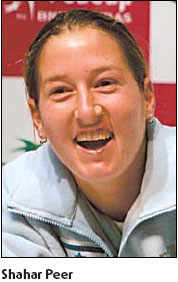Peer makes history in Gulf
DOHA: Shahar Peer, the 20-year-old from Jerusalem who has ignored an unofficial boycott that has kept Israeli players from competing in the Gulf states, will make diplomatic history when she steps on court at the $2.5 million Qatar Open on Monday.
The 12th-seeded Peer's first-round match against Francesca Schiavone, the world No 23 from Italy, would normally attract no more than a couple of hundred spectators and a handful of lines in the local papers.
Instead it has created a sensation.
Peer has suddenly acquired a global focus, received round-the-clock security, and apparently been given a promise that she would be treated "like the Emir's wife".

"I'm here to play tennis," she said. "But if this opens up a window for the younger generation, with Arabs and Israelis working together for peace, I'd be happy."
There is probably more to it than a worthy desire by an individual to contribute something to world peace.
Israel and Qatar have no diplomatic ties, which raises the question as to how and why this is happening now.
The emirate is bidding for the 2016 Olympics, about which a decision will be made next year. So this is a perfectly timed way of trying to suggest that politics won't tarnish any Games which come to the Middle East.
Qatar is said to be one of several moderate Arab states trying to broker peace talks between Israel and the Palestinians.
"We'd love to open an embassy there," the Israeli Foreign Ministry spokeswoman Amira Oron has been quoted as saying. "But for now, it's impossible."
Peer apparently wanted to compete here before, but was doing her military service and Israel bans its soldiers from visiting Arab countries.
Despite this, Peer is one of the few players on the women's circuit who speaks some Arabic, which she studied briefly in school.
Religious prejudice doesn't seem to be part of her make-up.
In the past she has played doubles with India's Sania Mirza, a Muslim whose cosmopolitan attitudes have upset some Islamic clerics and who has since decided it is impossible to compete in her home country.
Here Peer has so far found the situation far less extreme.
"She's an entry. She's a good player. It's a normal situation, and it gets a normal reaction from us," said tournament director Ayman Azmy.
Sane, even wise words. But the intensity of the reaction in the Gulf region suggests it is anything but normal.
AFP
(China Daily 02/19/2008 page24)














